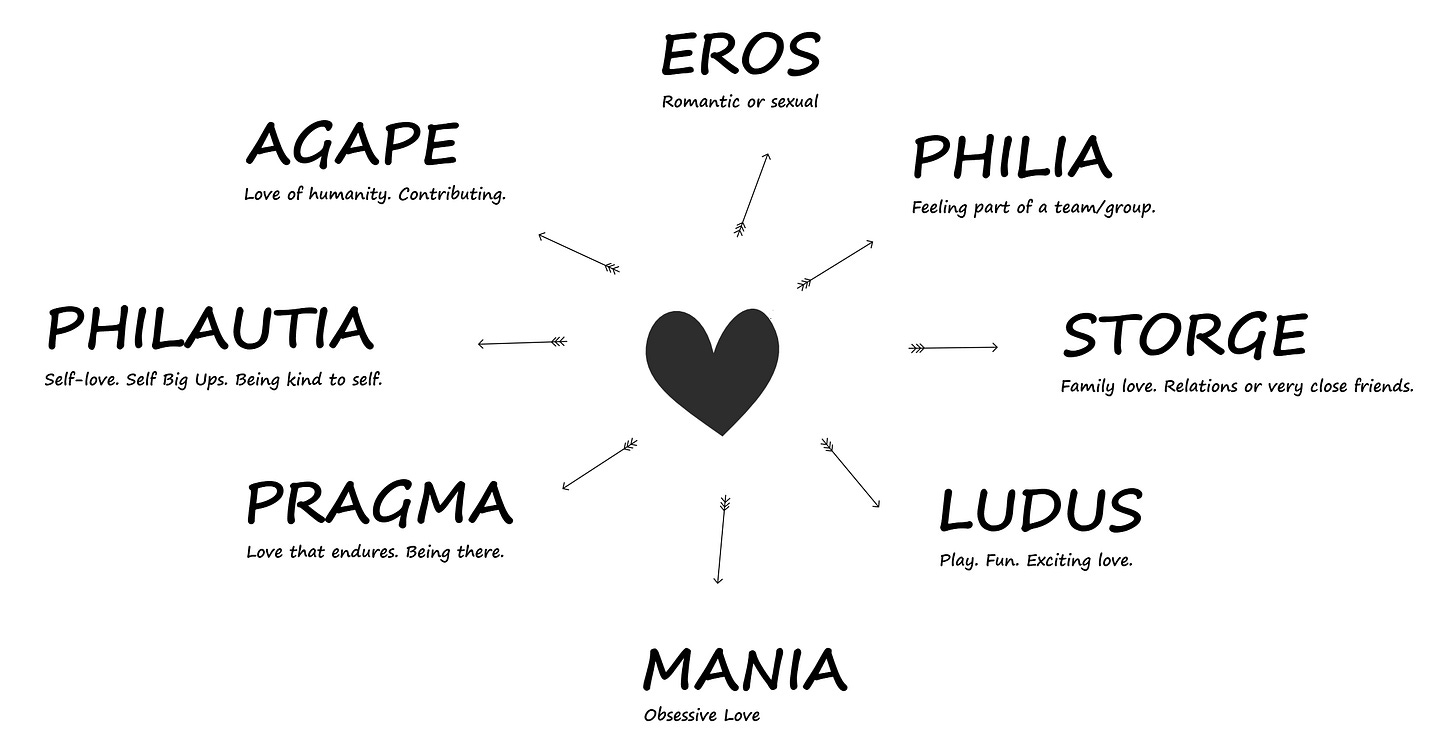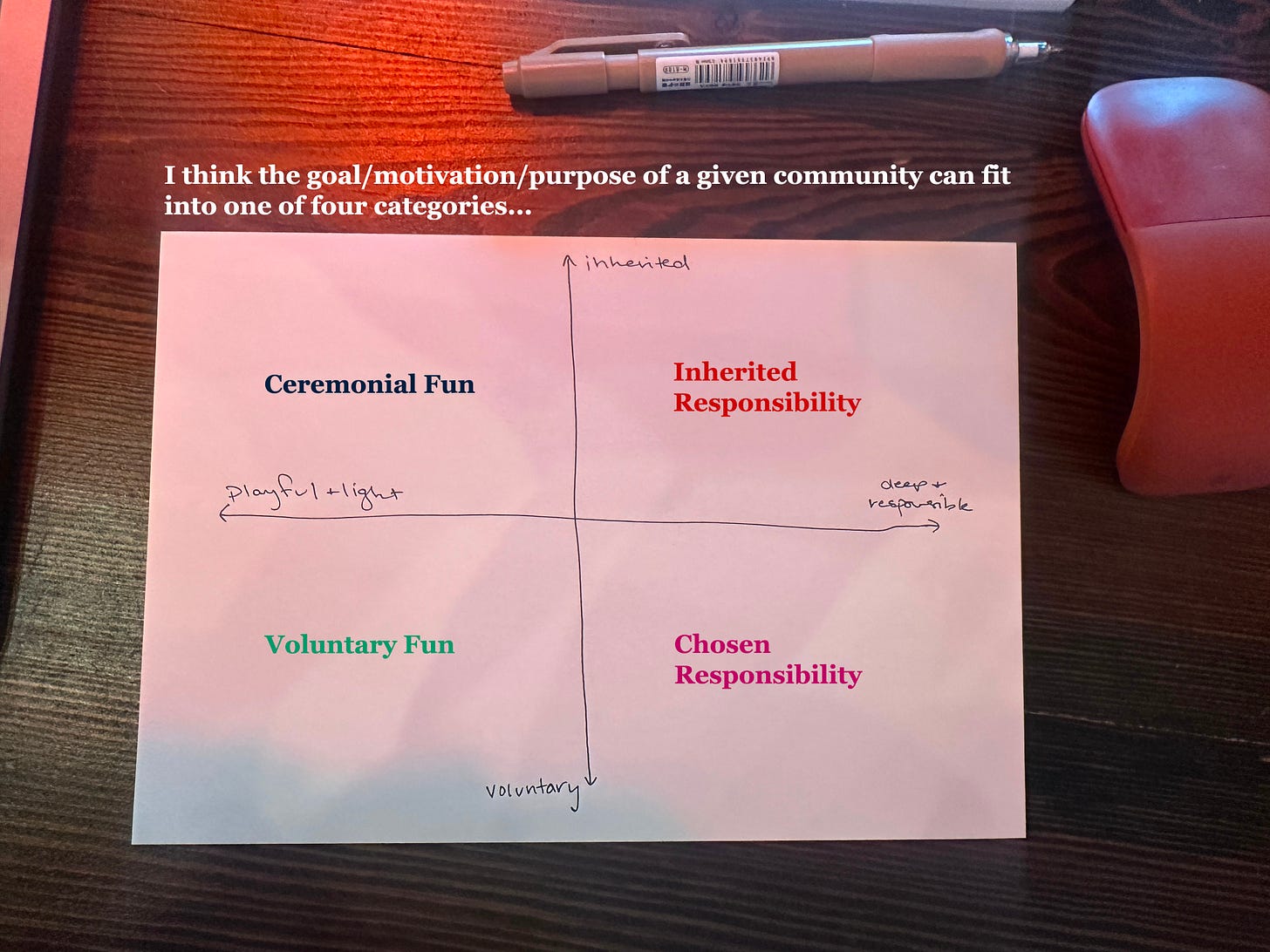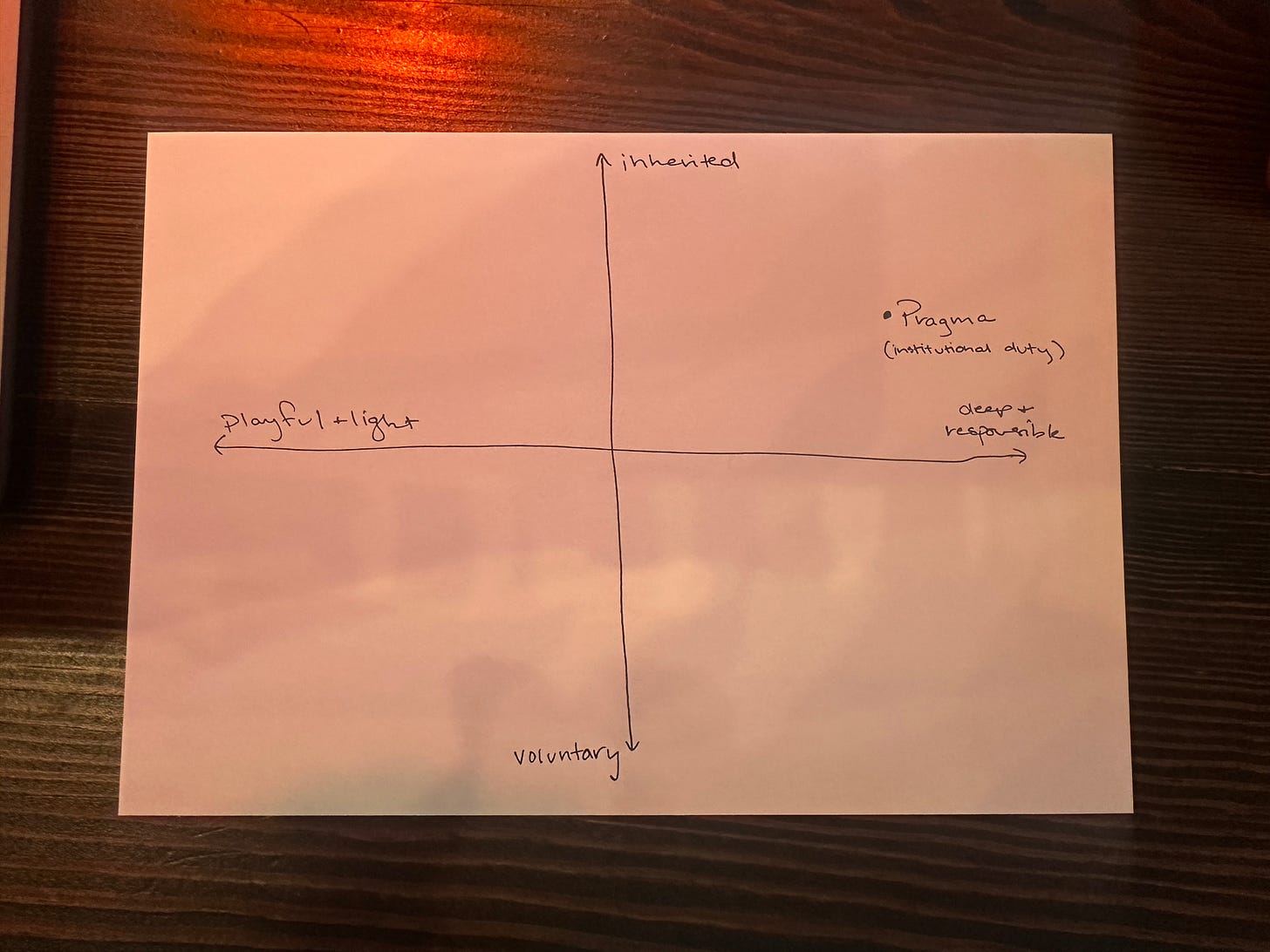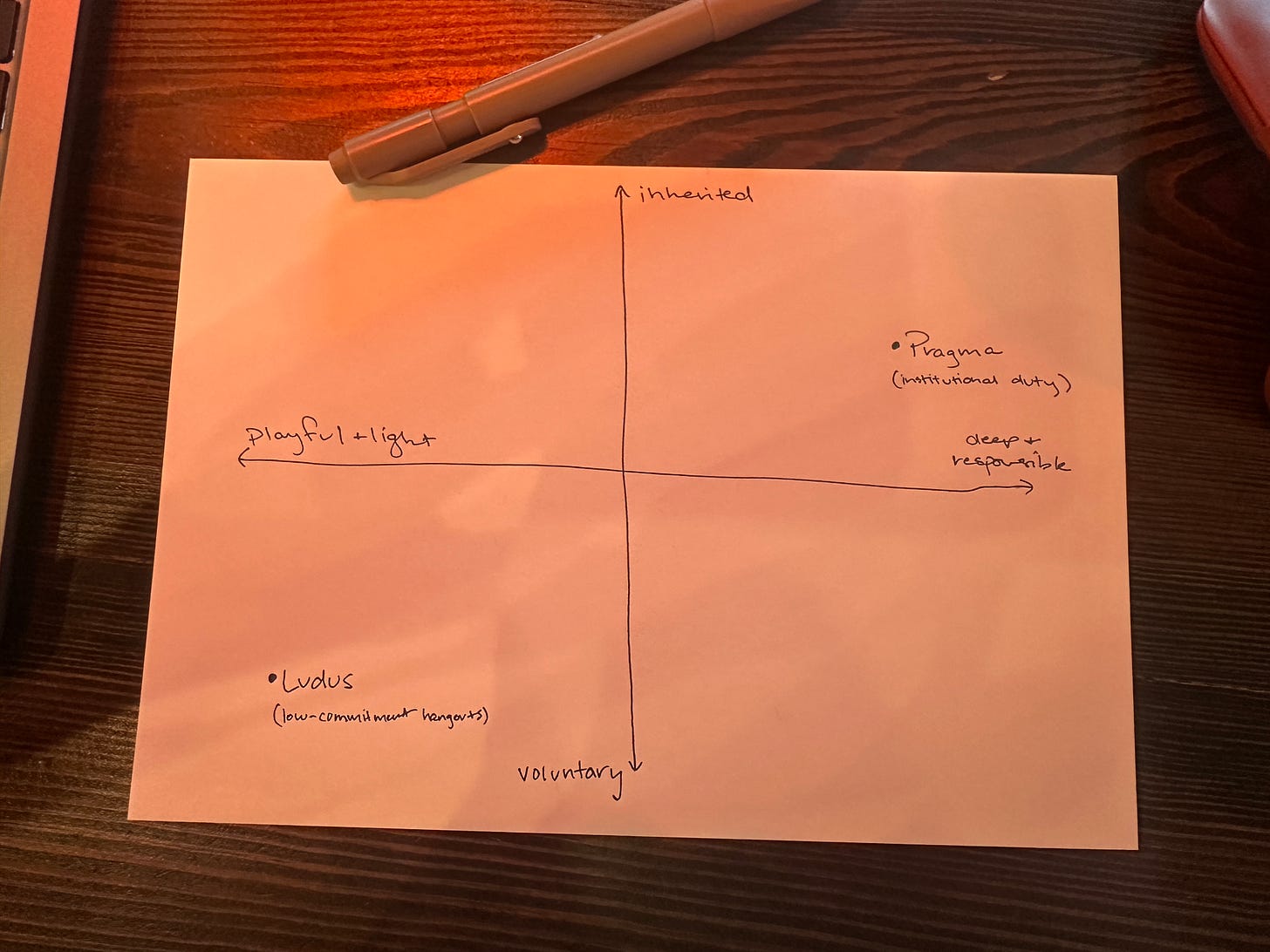05: a taxonomy for types of community (i think these make communities easier to build and harder to be disappointed by)
imagine the Greek terms for types of love... but for community! (and, yes, I made a diagram.)
The Greeks had many words for love (agape, eros, philia, storge) because one word wasn’t enough.
The way you love your sister is not the way you love a friend, a lover, or the divine. Each love came with its own expectations, intimacies, and responsibilities. I really, really believe we also need some sort of taxonomy for types of community.

Some communities are about common interests. These are your fandoms, your coworking Slack groups, your weekly kickball crew at Piedmont Park. Y’all are connected by what you like, what you do, or what you care about. These are important, and oh-so-nourishing, but they typically don’t ask much of us.
Other communities are about mutual liability. These tend to be forged in hardship, geography, or some shared vulnerability. Neighbors in an apartment building. Diasporic enclaves. Twelve-step groups. In these communities, people don’t just share interests… they share risk. You check in because you know someone might need something, or because you might, too. There’s an unspoken contract that I’m liable for you and you’re liable to me.
Then there are communities bound by shared responsibility. They’re connected because they’ve chosen — or inherited — a task, mission, or stewardship. You might think of teachers at a school who see their students as their responsibility (e.g. the teachers on Abbott Elementary - my favorite feel-good show). It could also be an interfaith group like me, fellow Christians, and our Jewish and Muslim peers at the Emerging Peacemakers’ Forum a couple years ago. Our group of ~50 hasn’t stayed in touch or pursued projects together because we believe the same things, but because we’ve agreed to be responsible for something (in this case world peace… no biggie) together.
This third kind of community is subtle but really powerful to me. It's not driven by affinity or sympathy, but by a commitment to shared action. What holds them together isn’t identity, or vulnerability, but a common responsibility to something beyond the group.
In what you are about to read, I make the case that we need different names for these kinds of community — like the Greeks had for love. Without the language, it’s much easier to confuse the roles. I think without differentiating between these, we get hurt when interest-based communities don’t show up like mutual-aid ones. Or we don’t build shared-responsibility communities because we’ve assumed community is something we find, not something that you just might have to build from scratch.
Alright, Kayla… get into it. What are the types of community?
First, I started listing out the types of communities I’m a part of: those I love, those I long for, and those I’ve lovingly left. I was able to map them along two axes:
X axis: Playful + Light ↔ Deep + Responsible
Y axis: Voluntary ↕ Inherited
Each quadrant holds a different kind of commitment… so for now I’m saying that membership to each type of community is driven by one of these:
Top Right: Inherited Responsibility
Bottom Right: Chosen Responsibility/Hospitality/Devotion
Bottom Left: Voluntary Fun
Top Left: Ceremonial Fun
Now I’ll walk you through some of the types I’ve placed in this map, starting with the most structured...
Inherited Responsibility (e.g. a school board)
Pragma — enduring, institutional love
In Pragma Communities, You’re a built in representative - you may have inherited a role, applied for it, or run for office. You’re inducted into a workplace, a university, or a research lab. It’s structured and ongoing… sometimes rigid and other times flexible. There are rules, expectations, and history.
Think: school boards, family-run businesses, elder boards at church, legacy nonprofits.
Voluntary Fun (e.g. a run club)
Ludus — playful, flirtatious love
Ludus Communities are light, joyful, and low-pressure.
In a Ludus Community, everyone is there for vibes. You might not stay long—but while you’re in it, it’s so great. I love these. When I did a summer exchange abroad in college, I’d meet new friends by going to concerts in London. If we vibed, we exchanged numbers, and would meet up again… but exclusively for concerts.
Think: run clubs, group chats (shoutout Monday Crew), improv classes, your fellow café regulars.
Chosen Responsibility (e.g. a bible study)
Divine Choice
Agape — unconditional, chosen love
It’s an Agape Community! You opted into this. But not only that, but you and the other people in it have a deep, shared sense of purpose, stewardship, or care. It’s not always emotional, but often profound.
Think: co-ops, mutual aid groups, collectives, chosen family, spiritual circles.
Chosen Hospitality
Xenia — sacred guest–host relationship
This kind of community emerges from welcome.
It’s not about similarity—it’s about care across difference.
Often temporary, but deeply meaningful.
Think: a 21-step program, a well-held dinner series, a bible study.
Chosen Becoming
Eros — desire, longing, transformation
These communities are driven by pursuit.
You enter them because you want something—not transactionally, but spiritually, artistically, or emotionally. They might be short-lived or slow-burning, but they move you and connect you to others who have the same, sometimes unspeakable, longing.
Think: residencies, art pods, collectives, writing groups, spiritual intensives, a Patreon community.
Ceremonial, Opt-In Belonging (e.g. a sorority)
Komyuniti — (rooted in ritualized affiliation, but low responsibility)
Okay! so! This category was the hardest to map a Greek love term onto. At the same time, I think this category is the most interesting. It didn’t match any of the Greek terms, so I asked GPT if any other languages had a word for this inherited low-stakes community, and the one that stuck was komyuniti — the Japanese transliteration of “community.”
My hypothesis is that these types of communities are a supremely modern phenomenon: Komyunities are the kind of community you inherit, affiliate with, or are loosely expected to participate in… but at the same time, these don’t actually require anything of you (except for maybe membership dues). You’re part of it in name, in ritual, or on paper but not in labor.
In Japan, komyuniti can be used to describe low-pressure, stage-of-life-based groups formed through school, workplace, or regional identity. These are things like university alumni groups, office bowling leagues, neighborhood associations—you belong, you’re lightly expected to show up, but you don’t owe it much.
Using this transliterated word felt right to me because it gestures toward the construct of community without the weight of obligation. A Komyuniti is more ceremonial than committed, and more symbolic than it is binding!
Think: sororities (greek… feels ironic. lol.), country-based alumni chapters, extended family group chats, that one Slack workspace you never left. There’s a name or merch or a certificate of membership… but not much is expected of you. And if something is expected, it’s membership dues, a contract, or something like that. You can dip in and out without consequence.
These can be beautiful when everyone is on the same page, but that rarely ever is the case. I think these get weird when some people are FULLY committed (like, to them, this is a Pragma Community and “everyone needs to stop acting like they don’t want to be here”) while others are treating it much more like a Luda Community; they don’t pay dues unless forced to, they participate in the traditions consistently, and they’d never list the organization on their LinkedIn or IG bio.
I think the ambiguity characteristic of Komyunities is lovely… as long as there are clear expectations or norms (I think great leaders are especially important in these!). Unfortunately, because of the ecology of these (people come and go, it’s hard to point down who is a member and who isn’t) expectations are harder to codify or get consensus on.
Thanks for reading! Let me know what you’d add/change/rename here! I’m so curious to hear what other people think. So please comment! Or if you are shy… text me or email me (kaylauevans@gmail.com) with thoughts, whenever. :)
Also - I know it’s been a minute! I was prepping for my qualifying exams this past few months! And I have my oral qualifier in a few weeks. :) So I have actually been writing much, much more than usual… but not for leisure… unfort. I’ll be back this summer to make up for lost posts. <3
xx Kayla







